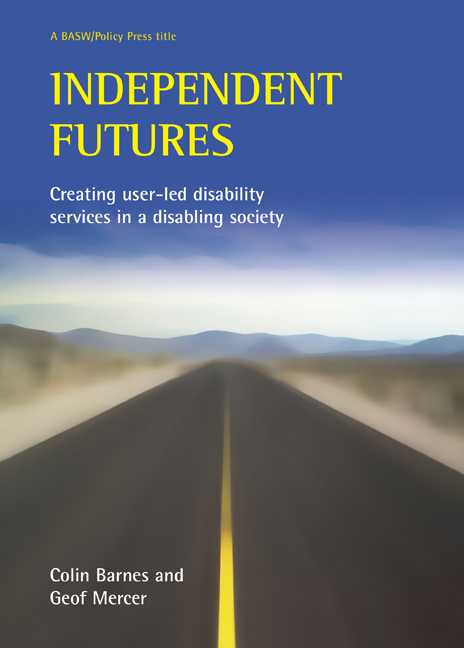Book contents
- Frontmatter
- Contents
- List of figures and tables
- Acknowledgements
- Notes on the authors
- one Examining user-led services
- two Traditional approaches: disability policy and the welfare state
- three Disability activism and the struggle for independent living
- four Researching user-led organisations
- five User-led organisations: building an alternative approach
- six Service design and delivery: opportunities and constraints
- seven Service users’ views and experiences
- eight Politics and campaigning
- nine Policy change or retrenchment?
- ten Future directions
- References
- Index
five - User-led organisations: building an alternative approach
Published online by Cambridge University Press: 15 January 2022
- Frontmatter
- Contents
- List of figures and tables
- Acknowledgements
- Notes on the authors
- one Examining user-led services
- two Traditional approaches: disability policy and the welfare state
- three Disability activism and the struggle for independent living
- four Researching user-led organisations
- five User-led organisations: building an alternative approach
- six Service design and delivery: opportunities and constraints
- seven Service users’ views and experiences
- eight Politics and campaigning
- nine Policy change or retrenchment?
- ten Future directions
- References
- Index
Summary
Introduction
This chapter begins the review of the fieldwork data collected as part of the Creating Independent Futures project. First, we examine disabled activists’ dissatisfaction with the ways in which successive governments promoted consumerism, via the marketisation of services, particularly the ideas and practices associated with user involvement and consultation. This is contrasted with the commitment of organisations of disabled people to a democratic or participatory approach. Second, we trace the diverse origins and growth of user-led organisations, looking in detail at nine case study sites. In the third section, we consider the adherence of user-led organisations to a social model of disability and how this is translated into the development and operation of user-controlled services. Finally, the discussion turns to the organisation, management structures and resources available to user-led services with reference to the key themes identified by research participants. These are: control, accountability, inclusion, and the tensions arising from organisational attempts to reconcile the principles of the social model of disability with the realities of operating within a service provider context that does little to recognise disabled people's experience of social exclusion.
Attention centres on the uneasy and sometimes fraught relationship between user-controlled organisations and traditional statutory and voluntary service agencies, and the dilemmas and compromises that arise when trying to implement a user-led philosophy and apply a social barriers approach to disability within a policy context still dominated by individualistic medical model thinking, and amidst other local and national political and economic constraints.
From user consultation to user-led services
It is important to stress, at the outset, an important distinction between the consumerist approach, sponsored by both Conservative and Labour governments since the 1990s, and that taken by the Disabled People's Movement, which adheres to a democratic/participatory approach. Each has a distinctive philosophy that underpins contrasting policy practices (Beresford and Croft, 1993; Wistow and Barnes, 1993).
The democratic approach emphasises that people have a right to participate, to be heard, to exercise choice, to define problems, and to decide on appropriate action. Increased service participation forms part of a wider citizenship project, increasing democratic participation and revitalising governance for disabled people and society generally (Beresford, 1993).
- Type
- Chapter
- Information
- Independent FuturesCreating User-Led Disability Services in a Disabling Society, pp. 71 - 92Publisher: Bristol University PressPrint publication year: 2006



